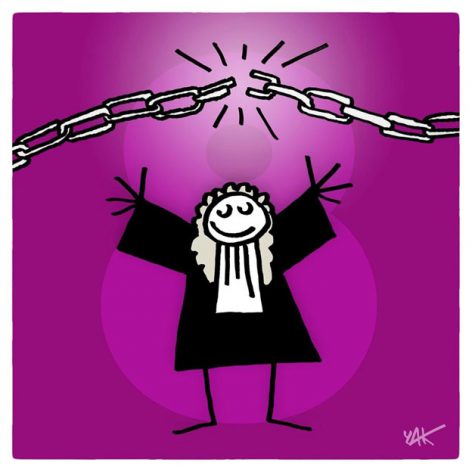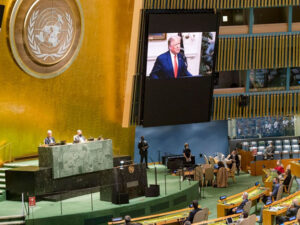
Civil Society, Democracy, Featured, Global, Headlines, Human Rights, IPS UN: Inside the Glasshouse, TerraViva United Nations

No one shall be subjected to arbitrary arrest, detention or exile. Credit: United Nations
– Today is International Human Rights Day, Normally, it should be an occasion to celebrate the work of those who strive to create peaceful, just, equal and sustainable societies. But conditions for human rights defenders and their organisations to operate freely are extremely challenging around the world.
Almost three quarters of the world’s people live in states that severely constrain civic freedoms. These are the latest findings from the CIVICUS Monitor, a cross-continental research collaboration between over twenty civil society organisations.
Despite enormous technological and cultural advancements claimed by humankind the overwhelming majority of the world’s population are being actively denied agency to shape the decisions that impact their lives. Major restrictions in law and practice on the fundamental civic freedoms of peaceful assembly, association and expression are putting journalists and civil society activists at serious risk of persecution when they expose high level corruption or critique the actions of powerful decision makers.
Civic space conditions in some 30 countries where over a quarter of the world’s population live are so poor that even the slightest hint of dissent against those who hold power can get one thrown into prison for a long time or even killed. Such countries include Afghanistan, China, Cuba, Equatorial Guinea, Eritrea, Myanmar, Nicaragua, Russia, Saudi Arabia, Syria and Sudan among others.
This year, Eswatini, Ethiopia and the Occupied Palestinian Territories of Gaza and the West Bank have been downgraded to the worst ‘closed’ rating on the CIVICUS Monitor due to an acceleration in repression there.
As a human rights defender it worries me that countries with proud histories of resisting colonial oppression and with hard won constitutional commitments to democratic principles such as India, Kenya, Mexico and the Philippines have ended up being placed in the second worst ‘repressed’ category on the CIVICUS Monitor.
As a development advocate who campaigned for the adoption of an ambitious set of universal Sustainable Development Goals (SDGs) in 2015, it concerns me that governments are deliberately limiting the ability of civil society organisations to work with them to create more equal and fairer societies.
Civic space restrictions negatively impact the quest for transparency, accountability and participation in public affairs. The Sustainable Development Goals include guarantees on access to information and fundamental freedoms as well as on responsive, inclusive and participatory decision making, which are essential for public spirited individuals and organisations to push for transformative changes in the political, social and economic spheres.
But CIVICUS Monitor researchers have recorded thousands of restrictions on the freedom of expression in 2024 including physical attacks on journalists and civil society activists merely for doing their work in the public interest.
Atefeh Rangriz, a defender of worker’s and women’s rights in Iran is currently languishing in prison on trumped up national security related charges. Guatemalan journalist Jose Ruben Zamora continues to be persecuted through the courts for exposing deep networks of patronage that exist among political and economic elites in that country.
Their cases are illustrative of the enormous challenge of thousands of journalists and civil society activists unjustly imprisoned around the world in countries as disparate as Belarus, Egypt, Israel and Vietnam.
The most recent CIVICUS Monitor Watchlist, released this September, draws attention to deterioration in civic space conditions in Argentina, Azerbaijan, Thailand and Zimbabwe, all of which are ruled by erratic authoritarian leaders. Because global civic space conditions are so challenging, including in several powerful states, the appetite of the international community to consistently call out flagrant violations of international law standards has been severely hamstrung in recent times.
It’s thus absurd that Azerbaijan, a petrostate with closed civic space, hosted the COP29 climate summit this year in an attempt to greenwash its reputation. The previous two COP summits were held in countries with equally appalling records: United Arab Emirates and Egypt. The election of Donald Trump, an avowed supporter of the fossil fuel industry, as the next president of the United States does not portend well for climate causes or for civic freedoms given his adulation for authoritarian leaders.
Climate justice, environmental and land rights activists are facing persecution in far too many countries for exercising their right to peaceful assembly. Earlier this year, five Just Stop Oil activists received sentences ranging from four to five years in prison in the United Kingdom for planning a non-violent protest action by blocking a motorway in 2022.
In Uganda, protestors were arrested merely for seeking to deliver a petition to the authorities outlining the adverse effects of an oil project including environmental degradation, land loss and violations of community rights. In September, Juan López, Honduran community leader and advocate for the rights of the Guapinol River, was assassinated despite calls for his protection.
Just as anti-apartheid protestors faced pushback in the 1980s, artists, students and academics have been targeted in several western democracies for advocating for the rights and dignity of the Palestinian people. It’s now forbidden to wear a keffiyeh within Canada’s Ontario state’s legislative assembly and there have been attempts to censor pro-Palestinian groups in Germany, the Netherlands and the USA. In Australia, four writers who had publicly opposed Israel’s war on Gaza had their workshops’ contracts terminated with the State Library of Victoria.
Nearly 10% of the total civic space violations documented globally in 2024 by CIVICUS Monitor researchers either took place in the Occupied Palestinian Territories or were perpetrated against those expressing solidarity with the Palestinian people. Despite this, throughout 2024 people continued to pour out onto the streets to express solidarity with beleaguered Palestinians. This in itself is extraordinary.
Even if global civic space conditions were mostly unwelcoming this year, civil society actions led to some remarkable victories for rights and justice. Greece became the first overwhelmingly Christian Orthodox country to legalise same-sex marriage while recognising the rights of same sex couples to adopt children. Thailand broke ground in Southeast Asia by passing a marriage equality bill in May 2024, making it the first country in the region to legalise same-sex marriage.
In the Czech Republic, civil society efforts led to a landmark reform in rape laws, now classifying any non-consensual sexual act as rape, removing the need for proof of force and strengthening protections for victims. In Kazakhstan, in response to a high-profile murder trial, lawmakers swiftly introduced new legislation that re-established criminal penalties for battery and enhanced protections for domestic violence survivors.
In Poland, a bill passed in February 2024 made emergency contraception accessible without a prescription, reversing a restrictive 2017 law and marking a significant win for womens’ rights over their bodies.
Moreover, people continued to exercise their protest rights across the globe this year. In Bangladesh, the longstanding oppressive government led by Sheikh Hasina was forced to step down following persistent public demonstrations against its regressive actions. In Venezuela, people outvoted the incumbent authoritarian government of Nicholas Maduro at the polls but his regime ended up rigging the election results. However, this doesn’t mean the struggle for democracy in Venezuela has been permanently suppressed.
“The arc of the moral universe is long, but it bends towards justice,” said Dr.Martin Luther King Jr. As these examples show, despite pervasive repression, the impulse to overcome oppression remains alive. Gains made through sustained civil society resistance through 2024 offer us hope that no matter how powerful autocratic forces may be, there will always be an undercurrent of civil society ready to weather the storm and strive for a better world for all.
Mandeep S. Tiwana is the Interim Co-Secretary General. CIVICUS, the global civil society alliance.
IPS UN Bureau











